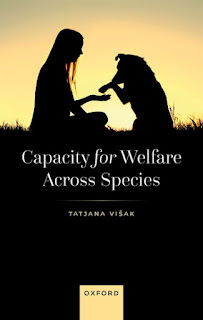 at various universities across the globe over the past 20 years. She is currently working in the field of psychology. She is the author of Killing Happy Animals - Explorations in Utilitarian Ethics (2013) and editor of The Ethics of Killing Animals (2016). She has published more than 30 papers about welfare and animal ethics in scientific journals and books.
at various universities across the globe over the past 20 years. She is currently working in the field of psychology. She is the author of Killing Happy Animals - Explorations in Utilitarian Ethics (2013) and editor of The Ethics of Killing Animals (2016). She has published more than 30 papers about welfare and animal ethics in scientific journals and books.
Višak applied the "Page 99 Test" to her new book, Capacity for Welfare across Species, and reported the following:
From page 99:Visit Tatjana Višak's website.for synchronic welfare. Proponents of EQU would probably feel more attracted to the relativize-to-natural-lifespan view than proponents of DIF, since EQU itself can be seen as a relativizing view. Nevertheless, I think that even in conjunction with EQU, the total-duration view has more going for it. I will further defend and apply the total-duration view in chapter 4.3.Does page 99 reveal the quality of the book?
4.3 An application of the total-duration view
In this chapter, I apply the total-duration view about how to take different lifespans into account in comparisons of welfare. (I introduced the total-duration view in chapter 4.2.) The chapter also engages with McMahan’s work on capacity for welfare across species and his notion of fortune, which I introduced and criticized in chapter 2.4.
In his paper “Eating Animals the Nice Way” Jeff McMahan (2008) explores whether there are ways of routinely using non-human animals for human consumption that are morally acceptable. McMahan ends his paper with the following consideration:The only form of benign carnivorism that is possible now – raising animals humanely and killing them painlessly – seems morally unjustifiable because the interest the animals would have in not being killed would decisively outweigh the interest people would have in killing and eating them. It does not, however, seem morally objectionable to eat an animal that has died of natural causes, which suggests that it could be permissible to use techniques of genetic modification, when they become available, to create animals that would die naturally on a predictable schedule and in good health. It is hard to see what could be wrong with this practice … (McMahan, 2008, 75)So, what could be wrong about creating individuals with a shorter natural lifespan? I will refer to the practice of benign animal agriculture that McMahan considers to be available now as the “mundane practice” and I will refer to the practice that may become available in the future as the “engineering practice”. McMahan says about the engineering practice that it is hard to see what would be wrong with it. He means this literally: while he would intuitively judge that the engineering practice is no improvement as
Yes, it does. Page 99 reveals that the book
· … is written in a clear and accessible language.
· … is well-structured.
· … distinguishes different theoretical approaches and applies them to interesting practical questions.
· … engages with major work in the field.
Page 99 is roughly two thirds through the book. Readers are already familiar with the “different capacity for welfare view” (DIF) and with the “equal capacity for welfare view” (EQU). These are the main views about capacity of welfare across species that the book aims at exploring. According to DIF, different species (such as humans, dogs, and mice) have different capacities for welfare due to different cognitive and emotional capacities. In contrast, according to EQU all welfare subjects have the same capacity for welfare despite different cognitive and emotional capacities. I defend EQU in the book.
EUQ and DIF T are views about the capacity for welfare of an animal at any given point in time, but what about capacity for welfare across time? I discuss this question around page 99. Do animals with a longer lifespan have a greater capacity for lifetime welfare, simply because they live longer and can gather more good moments in their lives? According to the total-duration view (which seems plausible to me) the answer is ‘yes’.
On page 99 I propose to apply the total duration view to evaluate an imaginary form of animal agriculture that Jeff McMahan explored in his paper “Eating Animals the Nice Way”. In this imaginary practice, animals are not killed, but they are genetically modified to have a shorter lifespan and so they die at the exact age at which they would otherwise have been killed. Would this engineering practice be an improvement? On the one hand, there is no killing, which seems better. On the other hand, McMahan has the intuition that we would still harm the animals by engineering them in that way. I distinguish different theories that can explain this intuition and point out their implications.
Browsers should not expect to grasp everything that is written on page 99 upon reading only this page. They should not expect a perfect overview of the book. Expecting merely some revelations about a book’s quality, I think the Page 99 Test can deliver.
--Marshal Zeringue



